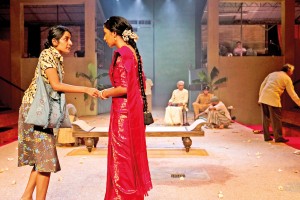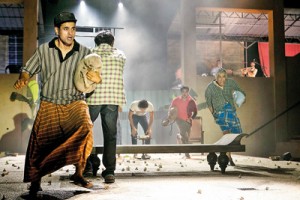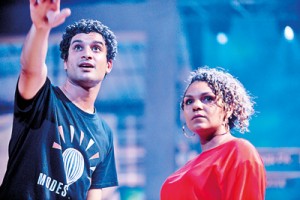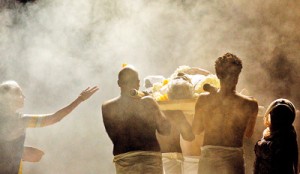A family’s journey

This week’s Magazine cover is by Ken Leanfore. Story pix by Brett Boardman
Shakthi : I’m a storyteller in the sense that I work across theatre, film and music, often mixing art forms. I write, direct and produce. But all of the work is ultimately about telling stories. My heritage – and the fact that I come from a migrant family – has a huge impact on my work, because it shifts the centre of my practice. I grew up in a household full of Bharathanatyam and Hindu mythology and culture, and those Indian classical aesthetic systems influence my work just as much as modern western modes of storytelling, aesthetics and cultural production. Being a migrant means you live between worlds, and finding your own way and space within that is a big part of discovering one’s particular artistic practice too.
Q: You founded CuriousWorks in 2005 as an initiative to helping people tell their stories. But did the seed for CuriousWorks stem from a need to tell your own story in a sense ?
Where I live in Australia, in western Sydney – if you go for a walk in the morning to get a cup of coffee (or to visit the local Sri Lankan spice shop!), within a few minutes you’ll meet people with ancestries from all over the world. And this great diverse mix of us live here on land that has been inhabited for at least 75,000 years by an incredibly sophisticated and resilient Indigenous culture. Those layers are what makes this country unique, but that version of Australia is so rarely told or portrayed. When I founded CuriousWorks the focus was very much on telling Australia’s untold stories. In particular it was about listening to communities that were under-represented in Australian culture and finding ways to give them the space to tell their own stories, in their own ways, along their own self-determined lines. Over the years we built a model for collaborating with cultural leaders in these kinds of places over a long-term period, and using the arts to help unleash cultural, social and economic impact in their communities. It was a long time before I even considered looking inward, at my own story or my family’s. Counting and Cracking is the first time I’ve done that.

Shakthi - Pic courtesy curiousworks.com.au
Q: Since its founding you’ve worked together with CuriousWorks on a series of creative initiatives, among those is the Lanka Project. Tell us more ?
Like many migrants, when I hit my late 20’s I started to get this itch. I felt I couldn’t know or build a future without knowing my past. I’ve been in Sydney since I was three years old – so despite being born in Sri Lanka, Australia is all I remember.
The Lanka Project was the beginning of my journey to better understand my homeland, and my Sri Lankan community. It started with listening: just listening and talking to a great deal of Sri Lankans in Australia from all walks of life. From that emerged a variety of different art works, some short films, a short dance work, and a very special outdoor artwork called The Other Journey, centred around the stories of two families that had come to Australia as refugees from Sri Lanka during the war. Counting and Cracking also emerged from this process.
Q:When did you really decide to sit down and put it all together and how did that process start for “Counting and Cracking” and what inspired you?
Growing up in western Sydney, my mother didn’t speak about Sri Lanka. I would hear stories at family dinners and you’d get this vague sense of what life might have been like there, but there was never anything detailed or concrete. My starting point for the journey of writing this play was to learn more about my roots. To learn more about how my own family came to Australia, to get a proper understanding of what their life in Sri Lanka was like.
But this purpose shifted as I talked to more Sri Lankans in Sydney and around the world. Through these conversations, a very real, tender, quiet voice began to emerge: a voice of a resilient, multicultural and nuanced people that had been rendered black and white by the politics of division. I started piecing together a picture of a community in all its glorious complexity. This was a story where many truths would gather in one space. I wanted to tell, through the story of one family, the story of a nation (well, two nations).

I listened. I listened to my extended family and a cross-section of the Sri Lankan community. In particular, people who would be labelled publicly as politicians or refugees or mothers or radicals but who all presented a very human, intensely personal view in private conversation. I listened for over three years before even writing the first draft, throughout the five-year development process and the listening continues today, as people talk to me about the deep impact the work has had on them.
What became clear was the loudest voices are often the ones who want to be right. The quieter voices are the ones who will listen, weigh up a range of ideas and options and arrive to a more complex truth. It was those quieter voices that I sought to give power to through this play.
Q: Are there any characters from the play that have been inspired by characters from your own family ? Is there some part of you in any one of the characters of the play?
The play is a work of fiction. But yes, certain characters have been inspired by members of my own family. There’s a fair bit of my mother’s spirit in it, there’s a fair bit of that lovely mix of strength and cheekiness and quiet power that many women in my family have, that many Sri Lankan women have. There is a character in the play inspired by the journey of my own great-grandfather, C. Suntharalingam. There’s a bit of me in one of the characters – not who I am now, but the person I was back in my twenties, more restless, searching.
Q:How did your family feel about you doing a play like this especially since it strikes chords that are very close to home and heart ?
They were very worried at first. My mother thought it was a “stupid idea”. My uncle used to routinely ask me when I would get a “real job”. It was all out of their love for me, of course. But the play has had this incredible effect of opening people up. It opened my mother right up, as she read the first draft, and started coming to some of the rehearsals. She started talking about Sri Lanka again. Some of what she said ended up in the final draft of the play. Counting and Cracking really helped her heal her relationship with her homeland, and I know it had that affect on many others who came to the work also. This kind of thing is what I am most proud of. Theatre and the arts can allow communities like ours to think about and discuss issues you could never just bring up at the dinner table. It can allow us to gather in one space and heal and reconcile. It’s the real power of storytelling.
Q: While the overall play is fiction. The themes address real experiences. What is your hope for the play for those who come to see it ?
I hope it allows Sri Lankans a chance to see a version of our history and our present that inhabits many truths at once. And in doing so, one that allows us to revisit the past without bias, just acceptance, and through that find a way to heal. I hope it allows all people, from all backgrounds, a chance to remember that families, communities and democracies must be nurtured. If we don’t nurture these things, we lose them. They crumble. They’re not automatic.
Q:The Sydney Town Hall show was sold out, and now the play is a contender for the best play of the year. What does that mean to you ? What aspect of the play do you feel resonates with the audience so much ?
Honestly, it’s been a real surprise. In the Australian context, it’s nice that the work has been celebrated in this way, because we very rarely see an Australian migrant story given this kind of respect. It’s a delight to see our stories acknowledged like this, as a central part of the Australian story.
And it’s been a real delight for the Sri Lankan community here I think – so many Lankans have come up to me and expressed real shock and happiness at how Australian audiences have embraced this very Lankan work. At its heart the work has two big love stories in it, and it’s multi-generational – there’s something there for grandparents, parents and children alike. So in that sense it has something for everyone.
Q: Which aspect of your Sri Lankan heritage are you most proud about?
At our best, there such a richness and strength in what we do – whether it be our passion, our resilience, our humour, our food, our sport or our culture. I love our diversity. We have this kind of distinctiveness, this idiosyncratic-ness to our families that can be overwhelming at times, but it really is very special. The island itself is also incredible – the feeling of the land.
You miss it when you’re away. You could write a million plays about Sri Lanka and you’d still only be scratching the surface.
Q: Will the play ever make it to Sri Lankan shores you think?
I hope so. We’re working on it. The Sri Lankan actors in the show are very keen to help make it happen, so it might just be possible that way!





